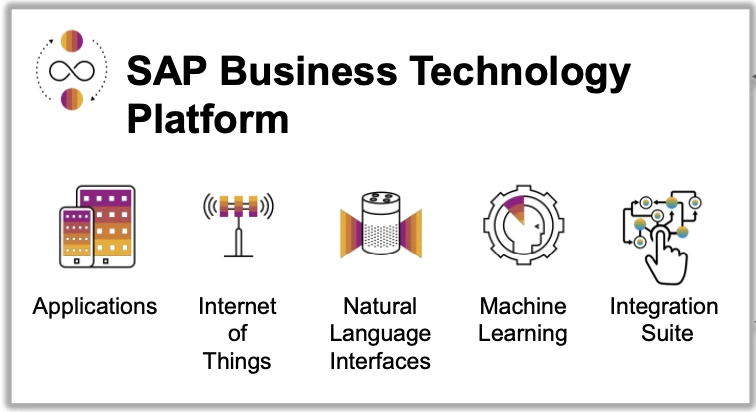Eursap’s Ask-the-SAP-Expert: Fabiana Bacon - SAP BTP Solutions Architect
Eursap’s Ask-the-SAP-Expert: Fabiana Bacon - SAP BTP Solutions Architect.
This month, we feature Fabiana Bacon, expert in the SAP Business Technology Platform, regular contributor to the work of ASUG Brazil, and one of the most followed SAP experts on LinkedIn.

Hi Fabiana, thank you for taking the time to chat to us. Firstly, can you tell us a little bit about yourself?
FB: I Live in Brazil, Rio de Janeiro. I love to travelling, extreme sports, and eating junk food. But during the pandemic I've been eating more healthily, I started drawing again, I've also been playing more video games - I love the game Rock Band!
How did you first get into SAP as a career?
FB: I started in 2012, at the time I had finished the Faculty of Mathematics and was finishing the Faculty of Computing. I worked with PL/SQL and it was a surprise when they put me on an SAP project. I didn't know what SAP was! It was the first time I heard that acronym. Hahaha!
I started with PI / XI, then I went to Webdynpro Java... Then I met Webdynpro ABAP and after a few years I went to pure ABAP.
What does a typical day look like for you now?
FB: Before the pandemic, I used to wake up very early to get to work early. Sometimes I went to the gym to sleep, oops, to work out! At home I watched television. But I did that from Monday to Thursday. On Friday, I took mini weekend trips to get to know new places. But I usually study something every day before I go to sleep.
After the pandemic, I did not travel for more than a year, working from home, cooking at home, ordering takeaway food hahaha. But I now have more time to study the technologies of the moment, new languages for example. I did not know English and within 5 months of studying I made my first presentation in May 2020 about SCP for the whole world. It was scary and rewarding at the same time!
Since then, I have been invited to lecture in the SAP area and it has been very nice to meet other people around the world, even if only virtually. And I went back to cycling almost every day! The main difference is I no longer having the freedom to travel.
How has your role changed in the pandemic? Are you working from home a lot more and delivering training online?
FB: Yes, my role at work has changed. We were planning to start the upgrade of our SAP system, and you know that upgrading is difficult in person, imagine doing it remotely with everyone in their homes. So it is logical that the hours have increased, weekly dedications to the project and online meetings. I'm afraid to open my fridge at night and find a Teams link inside it!
On the other hand, we all learn to work and deal with activities remotely without decreasing the quality of delivery. This reinforces that we can all work from anywhere in the world and it excites me a lot to try in the future!
During the pandemic I started to outline an online course for SCP (when SAP still called it SCP – more of that later). I launched the course this year in January! Now, I'm teaching SCP to other people and it's been fantastic! For now it is only in the Portuguese language, but this year I still want to have the BTP course (the new SAP brand for SCP) in English! If you want to take a look, I'll leave the link for the course here.
March 8th was International Women’s Day. SAP, and IT in general is traditionally dominated by men. As a successful woman in this space, have you found creating an IT career in SAP a challenge?
FB: It is true, these areas are dominated by men, but, by chance my class at the math school had more women than men. On the other hand, at the computer college there was only me. I never suffered prejudice during college, but I have already suffered prejudices from some clients. I graduated at a young age, so it's normal for my child-like face not to have much credibility hahaha! Once, I went to visit a client to talk about the company's problems, the secretary asked me to wait and I sat on one of the chairs. I saw a man come and go from the room several times. He never looked at me. Then, I asked if he was the person. Yes, it was him! He said to me that he never knew that I was the Developer sitting there waiting, he said he was waiting for an older guy.
Another time at another client, my boss called me for a meeting to talk about the best way to model tables in Oracle. During the meeting my boss asked me to speak so I gave my opinions, talked about the risks, showed the advantages and disadvantages for each model and everyone liked it. But when I left the room, the client commented to my boss: this intern is good! I was an SAP Consultant!
After telling these stories, I just wanted to say that I had no difficulties in learning the technical part, because I came from a strong background in mathematics. And unfortunately, there are stereotypes for everything in this life and we must deal with it in the best way. I do my best and always.
Any advice for other women wanting to follow in your footsteps?
FB: Yes. The first step is not to be scared by the amount of information that we need to deal with every day. You need to know that it is a career like any other in IT that exists, and that we keep improving for the rest of our lives.
Second, ignore negative people, Every area has people like that. Bitter people who have parked in life and career. Never listen to them!
Third, try to be among people who know more than you do, so that you can always learn from them. If you are no longer learning something new, it means you need to find more people. LinkedIn is great for that, as there are always inspiring people to learn something new.
Finally, you may not know it now, but you can take much more than you think. Don't lose your essence! What I always say to my students is you are bigger than all of that!
How have you used social media, such as LinkedIn and Instagram to your advantage in your career?
FB: When I started in the SAP Cloud area where I work, I researched relevant content and almost did not find it. Then I started studying at Learning Hub and started to gain experience in my day-to-day work. Then I thought: if I write about this technology, will they like it?
I started writing and it was good! I added the useful to the pleasant, because I was studying a new technology and talking about it. At the same time, I was learning English and training in reading and writing! I gained more and more connections, followers ... But all this on LinkedIn. On Instagram now that I'm getting organized to create SAP content there. With short and objective posts/ videos, but only in May will I really start! Whoever wants to follow, my Instagram is @fabianabacon.
A tip: when you are in a difficult phase with some SAP or IT project (or even any other area you work on), it means that you can take this difficult phase and turn it into a post, an article. So you win engagement and help other people. That is exactly what I do, and it has been working very well!
And you are now an expert in the SAP Cloud Platform. For those consultants out there who don’t understand what SCP is, can you give us a brief overview?
FB: Of course, yes! I will comment a little on the BTP (Business Technology Platform) which is the evolution of SCP (SAP Cloud Platform) for those who do not know yet. BTP is a Platform-as-a-Service (PaaS) with the flexibility to run on different Infrastructure-as-a-Service (IaaS). You can have BTP over Azure, AWS, GCP. As it is a PaaS, in the construction of the solutions, the services offered on the platform are used. Within SAP's strategy, it is the recommendation for Integrations and extensions with any SAP solution. The idea is that we make more extensions in BTP than customizations in SAP (ECC, SoH, S/4HANA).
A friend gave a very good example for everyone to understand BTP: "If you decided to open a gym, it would be something like this:
- IaaS - take a room, weights, mirrors and build everything.
- PaaS - you have the devices ready and you can choose how you will combine the aerobic room, weight training etc.
- SaaS - you open a franchise where a large part is defined, and we can make small adjustments.
In the future, on my Social Networks, I will talk more about BTP. Just follow this link.
And do you think that the cloud services that SAP offer now are beginning to push out the traditional on-premise systems and methodologies that SAP have relied on for so long?
FB: Certainly, yes! Many companies here in Brazil are learning that we no longer need to leave development within SAP, now we have the option of extending new solutions to the cloud, so yes, the work process has changed. We have a methodology that requires more care, because in our case, SAP Cloud Platform works like our frontend-Server. Before, we had a single team that developed the end-to-end of an application. But with the adoption of SCP, we can have several teams with different skills and even non-SAP to build architecture and applications, and not necessarily using Fiori or SAPUI5. And of course, this is all quite a challenge!
You teach a lot of people all about new technologies in the Industry 4.0 space, like big data, AI and data mining. Have you seen an upturn in demand for this kind of knowledge in recent years?
FB: In addition to teaching SAP Cloud Platform, I am also a teacher for IT Public Procurement in Brazil and the scenario of Brazilian Public Agencies is that there is a known demand on how to organise and make the best use of this data. Knowing how to use this data to be a more competitive company and deliver more value to its customers, understand its characteristics and bring products that solve some specific or generalised scenario.
We use the Internet for everything. Social networks are born and die every day. We have a lot of data being created every day and people are increasingly consuming everything that comes from their cell phone, for example. The demand is there, big companies already use our data as their main product.
Your skills are in the cutting-edge technologies of SAP. Our readers would be really interested to know how you keep up to date. How do you make sure your skills are always relevant in such a fast-moving environment?
FB: I have several tips here for you all:
- Make it a goal to learn some SAP technology (these tips are also for non-SAP technologies)
- Look on LinkedIn for Technology professionals in the areas you are learning, as their experiences will show you the best way forward. For example, I typed SAP Cloud Platform and started adding everyone from that area.
- Look for blogs and materials that can help you in any way. For SAP technologies, I refer to Eursap, OpenSAP, SAP Blogs, SAP Developers Site, Learning Hub and Content from SAP professionals on social networks.
- Follow the heads of SAP: Directors, Vice Presidents. They always have news about some SAP technology and indicate links with more details.
- Participate in Forums/Groups and exchange experiences with other people! It's the best place to ask questions!
- Study to get the SAP Technology Certification that you intend to be an expert on. This will open doors for you.
- Never give up! And repeat step 1.
Of all the exciting changes in the SAP space – SAP S/4HANA, Fiori UX, SCP, Rise with SAP, BW/4HANA, embedded and predictive analytics, Robotic Process Automation, Machine Learning, Blockchain, etc. – what do you find the most interesting and exciting?
FB: I confess that I haven't yet worked with SAP S/4HANA! All the technologies mentioned are very interesting and it is the present and the future of SAP! But the technologies that most inspire me are SAP Analytics Cloud - SAC, Business Technology Platform (the new Brand of SCP) and Machine Learning!
I have not yet formally worked with SAC, but I really want to marry these two technologies, SAC with BTP and use Machine Learning to bring me insights into some problem that my company needs to solve. I have some ideas, but I need time to implement them and I will definitely share this work with the SAP community.
And which of those new technologies do you think will turn out to be the most popular for SAP?
FB: Certainly, of these new technologies, it will be BTP with Machine Learning. More and more I see solutions using AI and Big Data in other non-SAP products and I believe that we will have more and more customers surfing this wave also aligned with the ideas of Digital Transformation & Smart Companies.
You are a key influencer in the American SAP User Group (ASUG), Brazil. What kind of involvement do you have with ASUG?
FB: I help ASUG Brazil with my technical knowledge in BTP and engagement with ASUG events. I also participate in Official SAP events on behalf of ASUG together with other Coordinators and Influencers. Together with the other Influencers, we created exclusive articles for ASUG Brazil, exchanging knowledge, doubts and experiences. The idea is to share knowledge with everyone.
Being at ASUG Brazil is wonderful, many other doors have opened for me and it is very nice to have contact with other companies within this community. To join ASUG Brazil, I suggest accessing their website. It is very worthwhile!
What would you recommend that an SAP consultant does if they want to upskill themselves on SCP?
FB: I recommend that you follow the 7 tips (or steps) as set out earlier and, above all, understand what you need to know about BTP: - Integration Suite - Extension Suite. If you can understand and put into practice these two pillars of BTP, it means that your skills are excellent! But for that you need to study to understand various concepts, services and tools.
And to gain advanced skills, I recommend that you go through all the journeys listed here.
Join the "SAP Integration Suite and SAP Extension Suite" community here.
It is hard work and it will take up a lot of your time, but it is what I said at the beginning of our conversation here: If you work with IT and/or SAP - You will study forever!

